Every day, our bodies fight invisible battles. Free radicals from stress, pollution, and even the air we breathe can harm cells and drain energy. As someone who’s studied nutrition for years, I’ve seen how antioxidant-rich foods can help. Foods like blueberries, kale, and dark chocolate act as our body’s defense system.
Antioxidants don’t just boost energy; they protect us. They help strengthen our immunity and improve our skin. When I replaced processed snacks with walnuts or spinach, I felt sharper and had fewer aches. This isn’t magic—it’s science. By choosing the right foods, we’re not just eating; we’re rebuilding our strength.
Key Takeaways
- Antioxidants neutralize free radicals that harm cells and energy levels.
- Blueberries, spinach, and nuts are top sources of antioxidant-rich foods for health.
- Regular intake supports immunity and may reduce chronic disease risks.
- Small swaps like adding berries to yogurt boost daily antioxidant intake.
- Science shows these foods help maintain vitality as we age.
What Are Antioxidant-Rich Foods?
Antioxidant-rich foods are key to a healthy diet. They protect your body at the cellular level. Let’s dive into how they fight disease and boost energy.
Definition and Importance
Antioxidants fight free radicals, unstable molecules that cause aging and disease. The importance of antioxidants in diet is clear: they stop these radicals before they harm cells. Foods like blueberries, spinach, and walnuts are full of these nutrients.
Key types include vitamins C and E, beta-carotene, and resveratrol. These nutrients don’t just prevent damage—they also repair cells.
- Vitamin C: Found in citrus, boosts collagen production.
- Vitamin E: Nuts and seeds protect cell membranes.
- Flavonoids: Berries reduce chronic inflammation.
How They Work in the Body
Free radicals form from stress, pollution, or bad diets. Antioxidants step in to stop them. They stabilize these molecules by donating electrons, stopping harmful chain reactions.
This process reduces oxidative stress, which drives conditions like heart disease and diabetes. The benefits of antioxidants include better brain function and stronger immunity. For example, lycopene in tomatoes guards against prostate cancer.
Cooking methods like steaming preserve antioxidant levels better than frying. This maximizes their protective effects.
- Bind to free radicals to prevent cell damage.
- Repair existing cellular damage caused by oxidation.
- Support long-term health by reducing disease risks.
Top Sources of Antioxidants
Choosing the right foods can boost your antioxidant intake. Let’s explore the best natural sources of antioxidants to enhance your daily nutrition.
Fruits High in Antioxidants
Berries are at the top for antioxidants. Blueberries, strawberries, and blackberries are full of anthocyanins, which fight cell damage. Pomegranates and cherries offer extra protection with their unique compounds. Try these options:
- Blueberries: Highest antioxidant capacity among common fruits
- Pomegranates: Contain ellagic acid for heart health
- Dark cherries: Packed with melatonin and antioxidants
Vegetables Packed with Nutrients
Leafy greens and cruciferous vegetables are full of antioxidants. Artichokes are at the top for plant-based options. Kale and spinach have vitamin C and beta-carotene. Red cabbage is special with anthocyanins like berries. Aim for:
- Artichokes: Leading vegetable in antioxidant content
- Kale: Rich in kaempferol and quercetin
- Red cabbage: 3x more antioxidants than green cabbage
Nuts and Seeds
Walnuts are the top nuts for antioxidants, with polyphenols that fight oxidative stress. Pecans and sunflower seeds add vitamin E for cell protection. These crunchy options provide:
- Walnuts: 2.5x more antioxidants than almonds
- Pecans: Balances antioxidants with healthy fats
- Chia seeds: Dual benefit of omega-3s and anthocyanins
Pair these foods wisely. Mix berries with yogurt, add kale to salads, or sprinkle nuts on oatmeal. Rotate these natural sources of antioxidants weekly for a variety of phytochemicals. Choose fresh, in-season produce for the best nutrients.
Health Benefits of Antioxidant-Rich Foods
Antioxidant-rich foods are more than a trend; they’re essential for good health. They fight off free radicals, which helps protect cells and boosts overall health. Here are three main ways they help.
Boosting Immune Function
Your immune system needs antioxidants to fight off infections. Vitamin C in citrus fruits and peppers helps strengthen immune cells. This can make colds shorter and less severe by up to 20%.
Try adding these immune-boosting foods to your diet:
- Oranges and kiwis for vitamin C
- Ginger and garlic for immune support
Reducing Inflammation
Chronic inflammation can lead to diseases like arthritis and diabetes. Antioxidants like anthocyanins in berries and curcumin in turmeric stop inflammation. For example, eating blueberries can reduce inflammation markers by 7% in just two weeks.
Supporting Heart Health
Antioxidants prevent LDL cholesterol from oxidizing, which helps prevent artery clogging. Flavonoids in dark chocolate and resveratrol in red wine improve blood flow and lower blood pressure. Eating antioxidant-rich foods daily can lower heart disease risk by 15%.
Antioxidants and Aging
Antioxidant-rich foods are more than just good for health—they help you age well. They fight oxidative stress, slowing down cell aging. This is good for your skin and helps you live longer.
🚀 Special Offer! Don’t Miss Out!
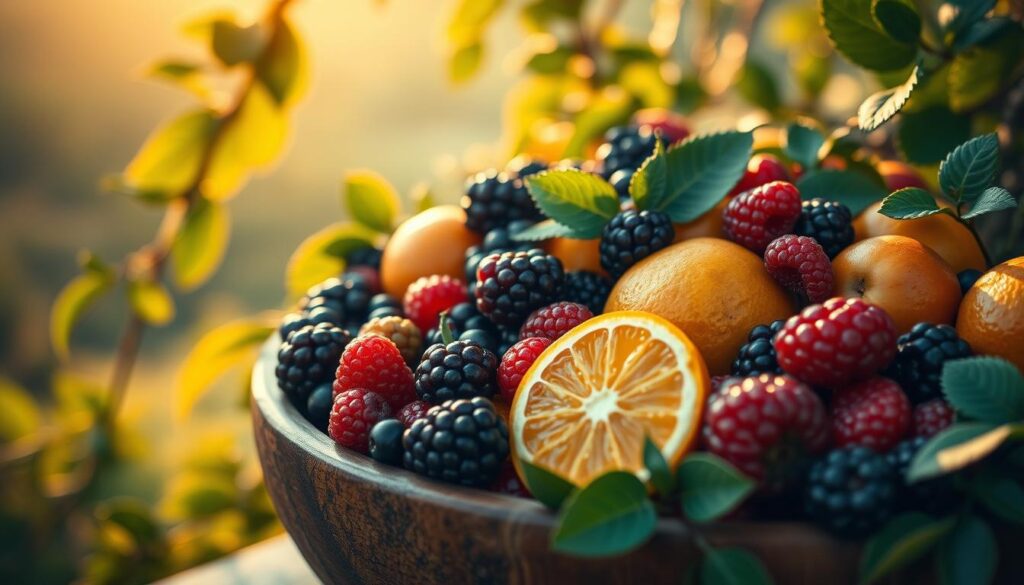
How Antioxidants Combat Aging
Free radicals cause aging by harming DNA and cells. Antioxidants stop these radicals, protecting telomeres. This slows down cell aging. People who eat foods rich in antioxidants often live longer.
Here’s how antioxidants work:
- They protect mitochondria, the cell’s energy source, to keep cells energized.
- They also reduce inflammation, which is linked to diseases like arthritis and heart conditions.
Role in Skin Health
Skin shows aging first. Antioxidants help by boosting collagen and keeping skin hydrated. This fights wrinkles and dryness. Both eating and applying antioxidants are important.
| Antioxidant | Food Sources | Benefits |
|---|---|---|
| Vitamin C | Citrus, bell peppers | Boosts collagen, brightens skin tone |
| Vitamin E | Almonds, sunflower oil | Blocks UV damage, retains moisture |
| Astaxanthin | Salmon, algae supplements | Reduces fine lines, fights oxidative stress |
Eating colorful foods daily and using sunscreen can greatly help. This way, you’ll see improvements over time.
Incorporating Antioxidant Foods into Your Diet
Starting an antioxidant-rich diet plan is easy. You don’t need to make big changes. Just add a little variety and simplicity to your meals.
“Colorful meals are nature’s roadmap to better health.”
Tips for Meal Planning
- Eat the rainbow: Include red berries, dark leafy greens, and purple grapes daily.
- Batch prep: Chop veggies and freeze berries for quick meals.
- Pair ingredients: Combine spinach with almonds or tomatoes with olive oil to boost nutrient absorption.
Creative Recipes
Try these antioxidant-rich recipes to make eating fun:
- Blueberry-Almond Smoothie: Blend frozen blueberries, almond milk, spinach, and chia seeds.
- Kale Salad Bowl: Mix kale, strawberries, walnuts, and balsamic dressing for a nutrient-packed lunch.
- Trail Mix Snack: Combine dried cranberries, pistachios, and dark chocolate chips.
It’s all about being consistent, not perfect. Adding one antioxidant-rich food to each meal can help. Try these ideas to make your own antioxidant-rich diet plan that you’ll love.
Common Misconceptions About Antioxidants
Many think that taking supplements is the best way to stay healthy. But science says otherwise. Let’s look at why relying only on pills might not be the best choice.
The Myth of Antioxidant Supplements
Some believe that taking more antioxidants means better health. But research shows this isn’t always true. Hormesis, a biological process, suggests that small amounts of stress from whole foods can be good. On the other hand, too much from supplements might upset this balance.
A 2018 BMJ review found that high doses of beta-carotene supplements increased lung cancer risk in smokers. My research shows that isolated compounds in pills don’t have the full range of nutrients found in natural sources of antioxidants.
💪 Transform Your Life with Health!
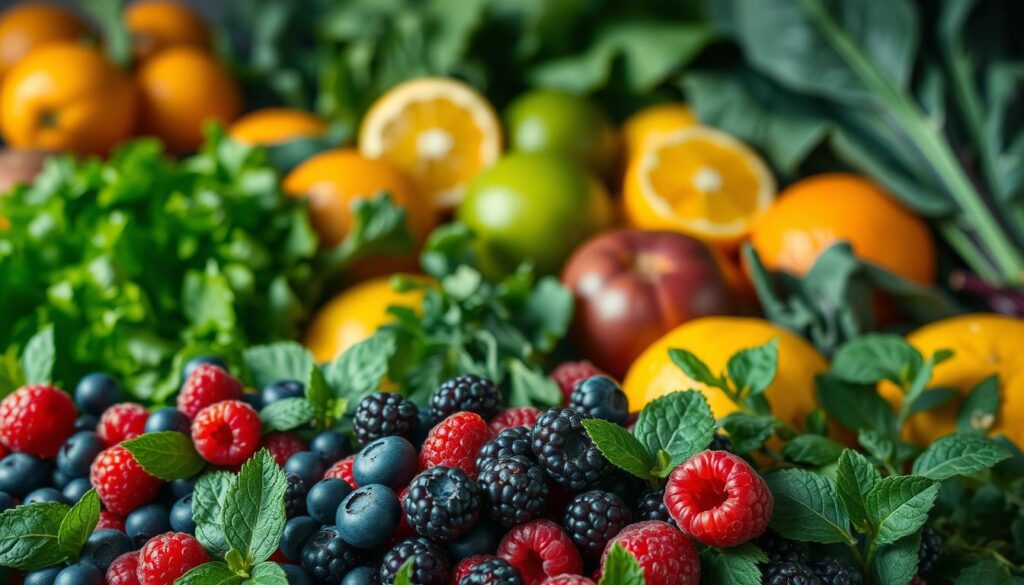
Sources vs Supplements: What’s Best?
“Whole foods provide antioxidants in a synergistic matrix that supplements can’t replicate.” – Dr. Alice Bender, American Institute for Cancer Research
| Aspect | Natural Sources | Supplements |
|---|---|---|
| Bioavailability | High (easily absorbed) | Variable (may bypass digestion) |
| Safety | No overdose risk | Potential toxicity (e.g., vitamin A overdose) |
| Cost | Affordable (berries, leafy greens) | Higher costs for premium brands |
| Synergy | Multiple compounds work together | Single compounds, less effective |
Whole foods like blueberries and spinach offer importance of antioxidants in diet through their mix of nutrients. Supplements, lacking this mix, are less effective over time. My advice is to eat colorful fruits, veggies, and nuts every day. Use supplements only when a doctor confirms a vitamin deficiency.
Knowing these facts helps us avoid expensive mistakes. Your diet, not supplements, is the real key to health.
Antioxidants and Mental Health
Research shows a clear connection between antioxidants and better mental health. The brain is very active and can easily get damaged by free radicals. Antioxidants fight these radicals, protecting brain cells and improving thinking.
Studies indicate that eating foods high in antioxidants can lower the risk of depression, anxiety, and memory loss as we age.
Connection to Brain Function
Oxidative stress can harm brain cells, leading to diseases like Alzheimer’s or Parkinson’s. Antioxidants, such as vitamin E and flavonoids, help protect the brain. A 2022 study in Nutrients found that eating foods rich in antioxidants can help older adults remember better.
Foods that Support Cognitive Health
Here are some foods that are good for your brain:
- Blueberries: Full of anthocyanins that help brain cells talk better
- Dark chocolate (70%+ cocoa): Has flavonoids that can make you feel happier and more focused
- Fatty fish (salmon, mackerel): Omega-3s and antioxidants help reduce brain inflammation
| Food | Key Antioxidant | Cognitive Benefit |
|---|---|---|
| Spinach | Lutein | Protects against age-related cognitive decline |
| Walnuts | Ellagic acid | Supports neurotransmitter production |
| Green tea | Catechins | Enhances focus and mental clarity |
Eating these foods every day can help you feel mentally sharp. While more research is needed, the current findings suggest that eating foods rich in antioxidants is very beneficial for your mental health.
The Role of Antioxidants in Disease Prevention
Antioxidants do more than just improve overall health. They play a key role in preventing serious diseases. Research shows that benefits of antioxidants help lower the risk of cancer and heart disease. This is especially true when we eat health benefits of antioxidant-rich foods every day.
⚡ Start Your Transformation Today!
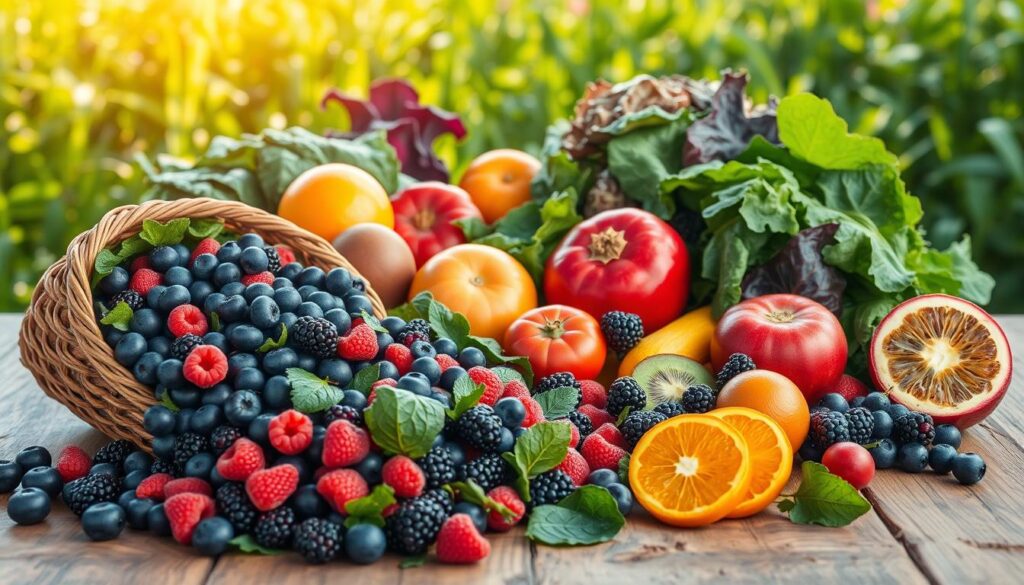
Cancer-Preventing Properties
Studies reveal that some antioxidants can stop cancer from growing. For example:
- Lycopene in tomatoes can slow down tumor growth.
- EGCG from green tea blocks harmful substances.
- Sulforaphane in broccoli sprouts fixes DNA damage.
Research links eating foods rich in these antioxidants to lower cancer rates. But, taking antioxidant supplements alone doesn’t have the same effect. This shows how important it is to eat whole foods.
Heart Disease and Antioxidants
Antioxidants help protect our blood vessels in many ways. Foods like:
| Food | Key Antioxidant | Cardiovascular Benefit |
|---|---|---|
| Olive Oil | Hydroxytyrosol | Reduces LDL oxidation |
| Nuts | Vitamin E | Improves artery flexibility |
| Dark Chocolate | Flavonoids | Lowers chronic inflammation |
These foods also give us healthy fats and fiber. This combination creates even more health benefits. My research finds that antioxidants work best when we exercise and eat less processed food.
How to Optimize Antioxidant Intake
To get the most from an antioxidant-rich diet plan, it’s not just about eating foods high in antioxidants. How you cook and pair them matters a lot. Here are some tips to improve your approach:
Cooking Methods That Preserve Nutrients
Not all cooking methods are the same when it comes to antioxidants. Steaming or roasting can make them more available and keep them intact:
- Steaming: Great for antioxidants like vitamin C in broccoli or bell peppers.
- Roasting: Boosts lycopene in tomatoes and beta-carotene in carrots, making them easier to use.
- Quick sautéing: Use a little oil at low heat to keep polyphenols in spinach or kale.
“Pairing antioxidants with fats increases absorption—like vitamin E with olive oil or carotenoids with avocado.”
Combining Foods for Maximum Benefits
Food synergy can make antioxidants work better together. Try these pairs:
- Leafy greens + healthy fats: Spinach salads with olive oil boost fat-soluble antioxidants.
- Berries + nuts: Blueberries and almonds offer a vitamin E and vitamin C combo that fights oxidative stress.
- Tomatoes + garlic: Together, they enhance lycopene’s heart-protective effects.
Dark chocolate (70% cocoa) with walnuts adds antioxidant layers. It’s a snack that supports brain and heart health.
Small changes in how you prepare and mix foods can make a big difference. Your kitchen is where science meets practicality. Use these tips to make every bite count.
Conclusion: Making Antioxidant-Rich Foods a Priority
Choosing foods high in antioxidants is key for your health. It helps your body fight off damage and stay healthy for a long time. Antioxidants do more than just keep you from getting sick. They make you feel alive and full of energy at every meal.
Key Takeaways
Foods like berries, leafy greens, and nuts protect your cells. They boost your immune system, lower inflammation, and keep your heart strong. Eating whole foods instead of supplements gives you the best mix of nutrients.
Your Next Steps
Begin by adding one antioxidant-rich food to each meal. Try nuts or dark chocolate instead of chips. Keep frozen berries, spinach, and almonds on hand. Replace processed foods with whole foods slowly. Small changes add up over time.
By making these foods a regular part of your diet, you’re choosing a healthier future. Every bite of antioxidants means more energy, clearer skin, and better focus. Start this healthy habit today and invest in your well-being for years to come.
FAQ
What are antioxidants and why are they important for health?
Which foods are the top sources of antioxidants?
How can I incorporate more antioxidant-rich foods into my diet?
Do I need to take antioxidant supplements to reap their benefits?
What are the health benefits of consuming antioxidant-rich foods?
Can antioxidants help with aging?
How do cooking methods affect the antioxidant levels in foods?
Which antioxidants are particularly beneficial for mental health?
What are some creative recipes to boost my antioxidant intake?
Did you like this article? See also: https://powerfitguide.com/how-to-increase-cardiovascular-endurance/

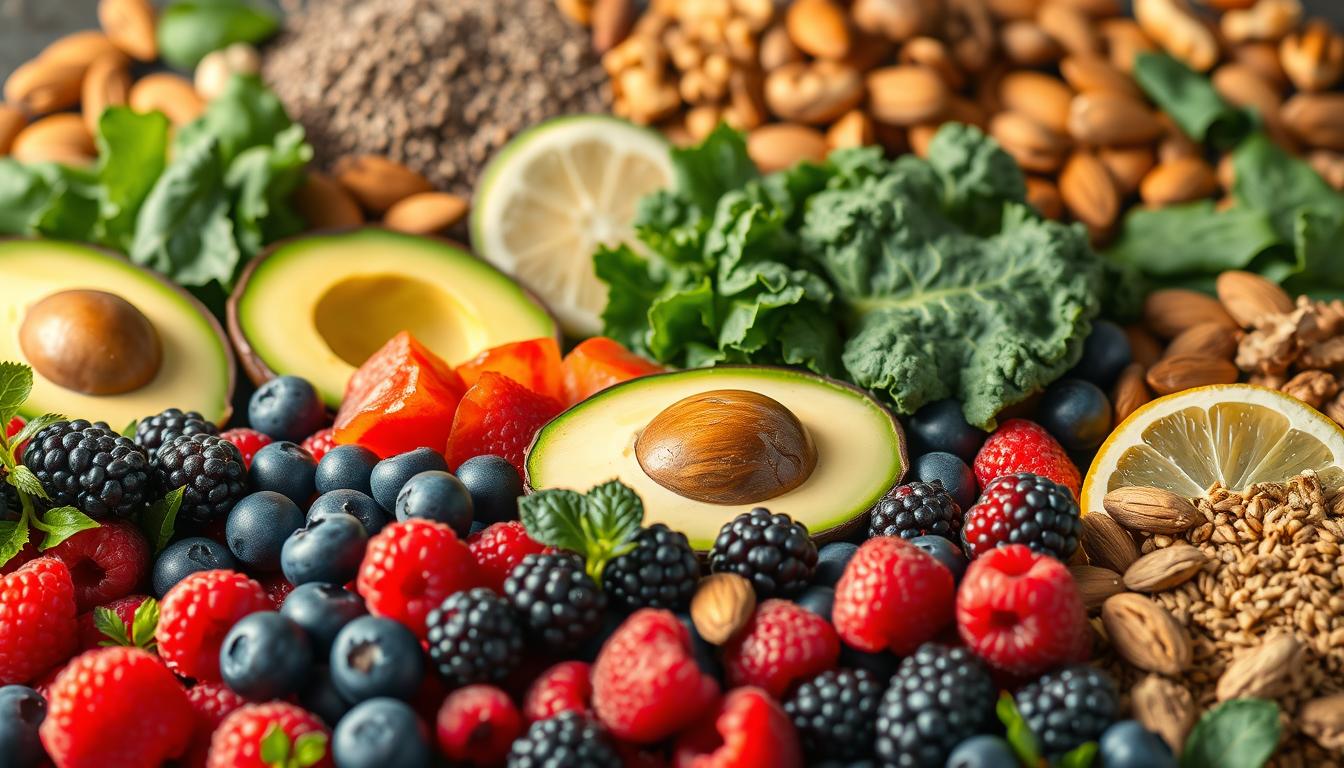
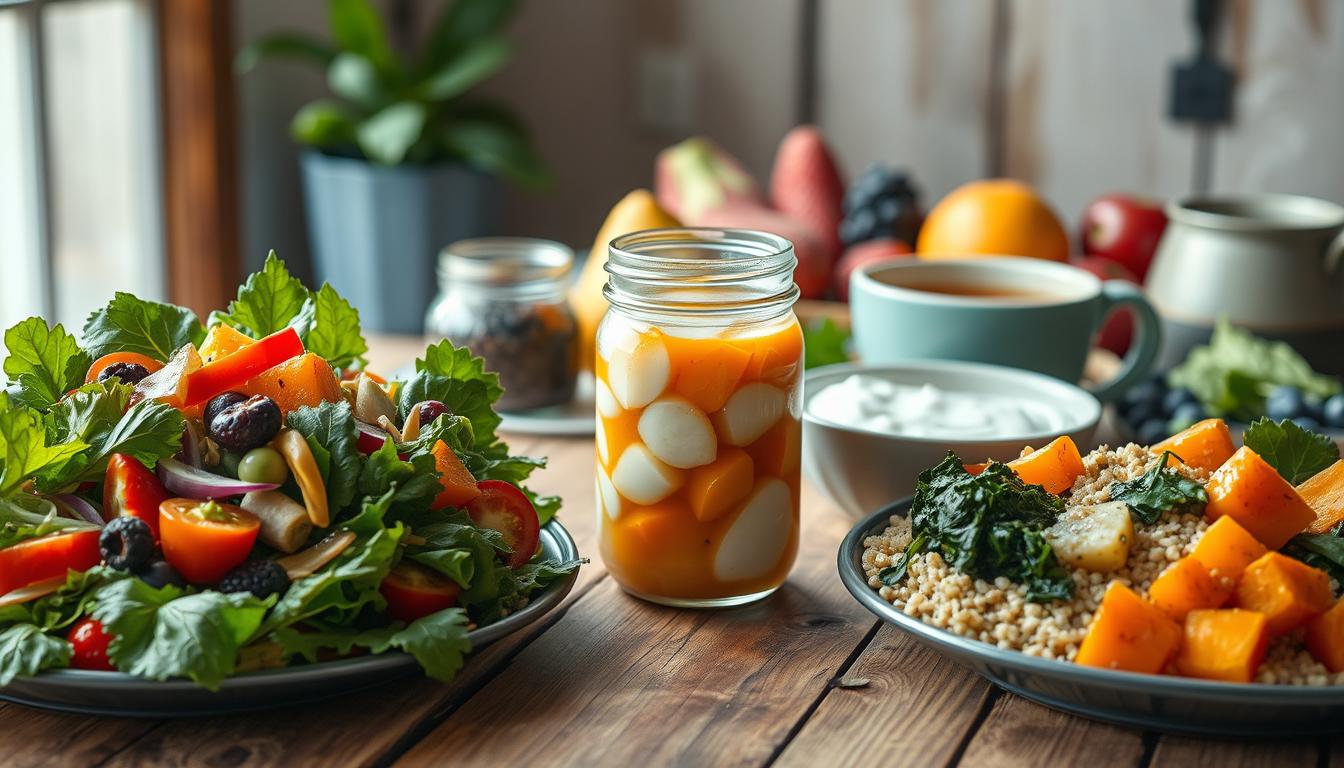
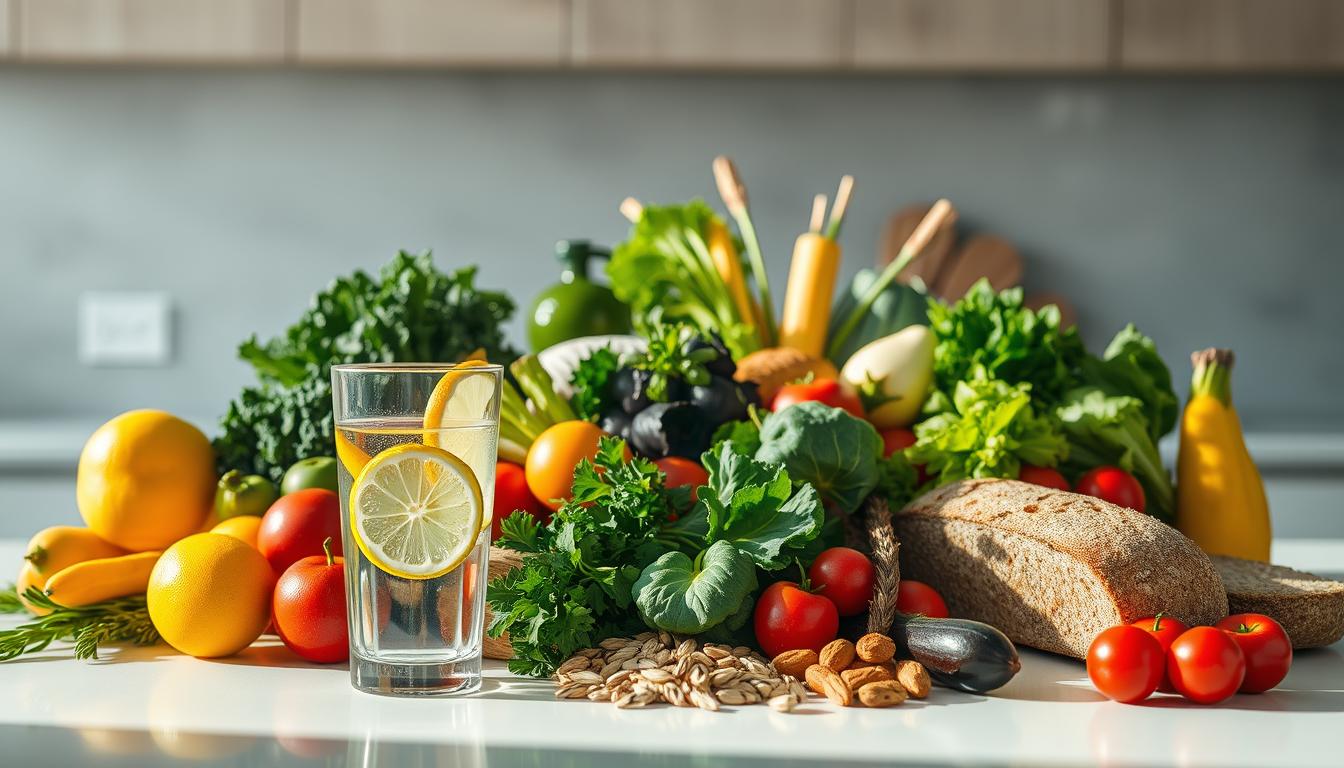

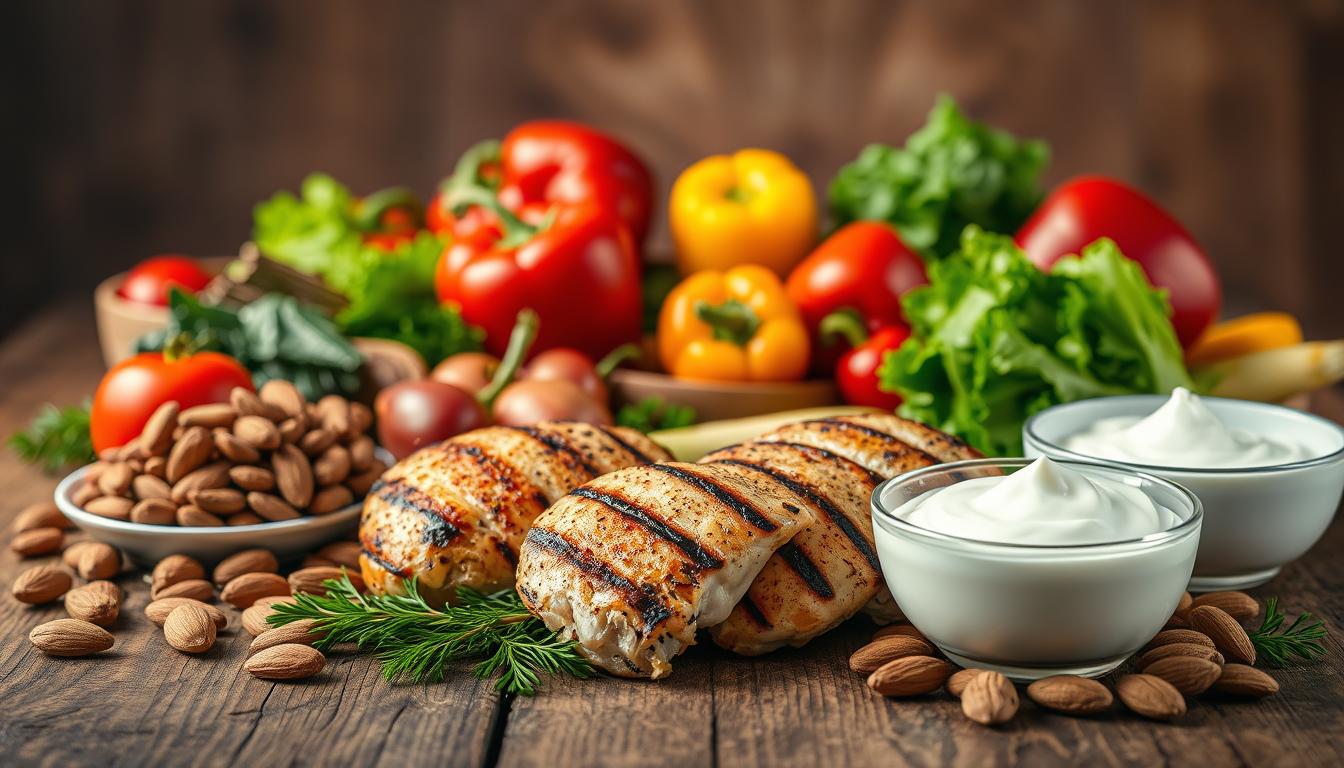


Comment on “Supercharge Your Body with Antioxidant-Rich Foods”